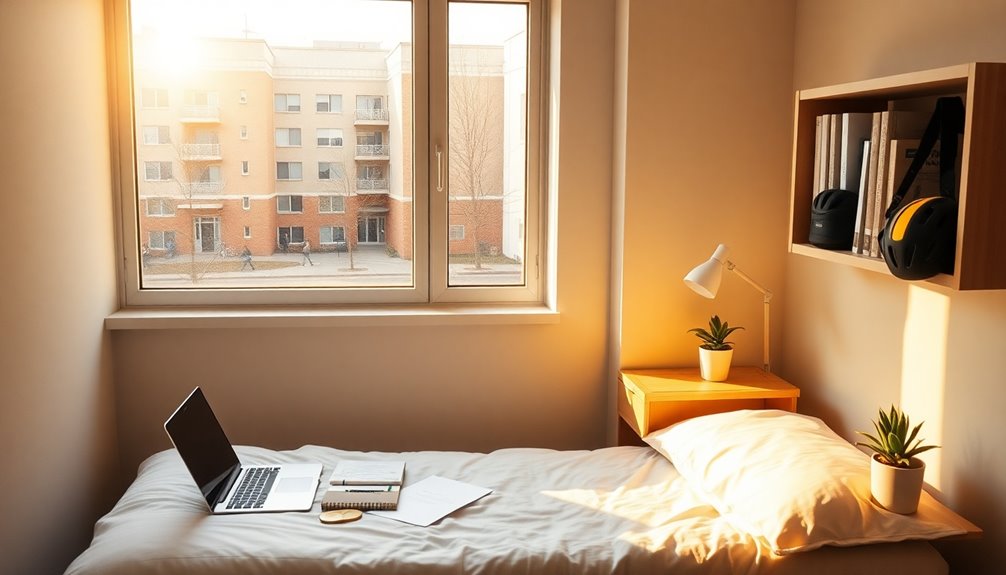
You’ll save money and time by choosing a budget student room near your school — lower rent often beats long daily travel costs, and you’ll cut bus or train fares plus wear on a bike or car. Shorter commutes give you extra hours for study, part-time work or social life. Utility and broadband bills are easier to manage with roommates close by, and you’ll be better placed to tap grants, campus jobs and local discounts if you want to learn more.
Highlights
- Save money on rent and utilities so more budget goes to essentials, study materials, or savings.
- Cut commuting costs and time, freeing money and hours for classes, work, or rest.
- Easier access to campus resources, libraries, labs, and social events boosts academic performance.
- Shorter travel times reduce stress and improve safety, especially for late-night study sessions.
- More flexible schedule for part-time work, extracurriculars, and spontaneity without long commutes.
Monthly Rent vs. Commuting Costs: Which Saves More for Irish Students?
While choosing between a cheap room near campus and a cheaper rent farther away, you should weigh monthly rent against commuting costs to see which actually saves you money; rides, buses, or trains add up fast, especially when you factor in season tickets, occasional taxis, and the value of your time. You’ll want to tally commuting expenses—fares, passes, and travel time—against housing benefits like safety, storage, and study convenience. If shorter commutes free hours for work or social life, that counts. Run scenarios for a term, not a month, and pick the option that preserves cash and freedom.
Utilities, Broadband and Bills: Estimating Real Living Expenses
A few lines on paper can save you a lot: utilities, broadband and other bills often add 20–30% on top of your rent, so factor them into any budget right away. You’ll want to list expected utility costs — heating, electricity, water and refuse — and check if any are included in rent. Compare broadband options for speed, price and contract length; shared connections can cut costs but check reliability. Aim for providers with student-friendly short terms. Track monthly usage, set alerts and split shared bills clearly. Being proactive gives you freedom to choose where to live and how to spend.
Food, Groceries and Cooking: Cutting Weekly Spending With Smart Habits
If you want to shave weeks off your grocery bill without eating cardboard, start by planning meals and shopping with purpose: list recipes for the week, check what you already have, and base your shopping on ingredients that can be reused across dishes. You’ll save time and avoid impulse buys. Embrace meal planning, buy versatile staples, and use bulk buying for long‑lasting items like rice, pasta, oats, and canned goods. Cook larger portions, freeze portions for later, and repurpose leftovers into new meals. Shop seasonal produce, compare unit prices, and stick to a short list so you keep control and stay flexible.
Part-Time Work, Transport and Time Management: Balancing Earnings and Savings
Time is your most valuable student-budget resource, so you’ll want to find part-time work and transport options that boost income without eating into study time or savings. You should map time allocation weekly, blocking classes, study and peak work hours to avoid clashes. Pick earning strategies that match flexibility — gig shifts, campus roles or remote microtasks — so you control hours. Choose cheap, reliable transport: a bike, season pass or shared rides to shrink commute costs and reclaim study time. Regularly review your schedule and finances, trimming low-value commitments so you keep freedom, grades and a steady cash flow.
Government Supports, Grants and Tax Breaks: Maximising Available Financial Help

Because government aid can seriously reduce your costs, it’s worth knowing what grants, loans and tax breaks you’re eligible for and how to apply. You should check local and national schemes, deadlines, and required documents before starting a grant application. Keep records, proof of enrolment, and receipts to speed processing. Learn basics of financial literacy so you can compare loan terms, interest rates, and tax reliefs that suit your lifestyle. Use online portals, student finance advisers, and free workshops to claim everything you’re entitled to. With a bit of effort, you’ll stretch your budget and keep freedom to choose where and how you live.
Some Questions Answered
Are There Communal Study Spaces in Budget Student Housing?
Yes — you’ll often find communal study areas in budget student housing. These spaces sit alongside a communal kitchen and social zones, letting you switch between cooking, relaxing, and focused work. Group study rooms or designated quiet corners are common, so you can collaborate or concentrate as you prefer. They’re designed to give you freedom to choose how and where you work, with flexible booking or open-access arrangements to suit your routine.
Can I Bring a Pet to a Student Room?
Usually you can’t bring pets to a student room, but policies vary—check each provider’s pet policies before you sign. If pets aren’t allowed, some places offer pet-friendly units or nearby vetted landlords who’ll accept animals. Think about your student lifestyle: time, costs, noise and cleaning. You’ll want proof of vaccination, deposits or extra fees where permitted. Ask for clear rules on visitors, exercise areas and responsibilities beforehand.
What Security Measures Are in Place for Student Properties?
You’ll find robust security measures in place for student properties: secure entry systems, CCTV in communal areas, well-lit grounds and regular patrols, all designed to protect tenant safety. Landlords often provide secure bike storage, individual locks on rooms, and responsive maintenance/incident reporting so you can live freely without worry. Emergency contacts and tenant vetting add extra reassurance, letting you enjoy independence while staying protected.
Is There Flexible Lease Length or Semester-Only Rent?
Yes — you can get flexible lease options and semester-only rent to match student budgets and changing plans. You’ll find short-term, semester, and rolling leases that let you leave between terms or extend if you’re staying. Many landlords offer pro-rated moves, easy renewals, and clear notice periods so you’re not tied down. This gives you the freedom to study abroad, intern, or switch campuses without huge penalties.
Are Deposits Refundable and What Deductions Are Typical?
Yes — deposits are usually refundable if you meet the terms. You’ll get a clear deposit return policies statement showing timelines and required condition. Typical wear deductions cover cleaning, damage beyond fair wear, missing keys, and excessive stains or holes; normal scuffs and light wear shouldn’t be charged. Document the room with photos, keep receipts for repairs, and communicate promptly to maximize your refund and maintain freedom to move on.
Summing Everything Up
Choosing budget student rooms near your school can cut rent, save commuting time and transport costs, and free you to study or work more hours. You’ll manage bills, broadband and groceries better when you’re nearby, and you’ll make the most of grants, tax breaks and part‑time income. Imagine stepping out of your door and into class in minutes—doesn’t that calm the chaos and boost your savings? It’s a practical, money‑smart move.
